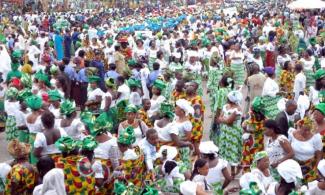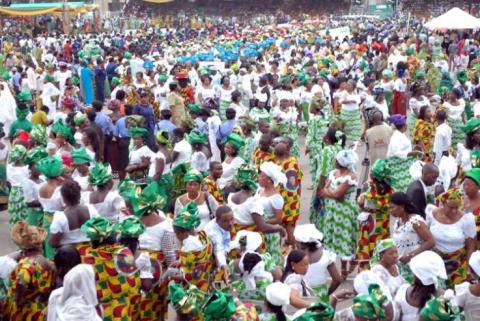
This Demand Charter reflects the yearnings and aspirations of women in Nigeria particularly the female politicians to enjoy their human rights and equal representation as members of various political parties in Nigeria.

Recently, different women organisations met in Uyo, Akwa Ibom State in a bid to strategise on how best to raise awareness and sensitise political party leaders on the need to take action to address the issue of women’s political powerlessness and under- representation in political party structures and governance.
A major outcome of the meeting is the vision of the Nigerian Women Demand Charter. Past efforts at raising the voice of women including the adoption of the ‘Womanifesto’ by the women’s organisations for increased representation to political parties have not yielded the desired results.
This time, they settled for the need to build the capacity of women within the party under Women in Politics Forum (WIPF) to be able to demand increased participation and accountability through presentation of Charter of Demand to the leadership of parties via Inter-Party Advisory Council (IPAC).
This Demand Charter reflects the yearnings and aspirations of women in Nigeria particularly the female politicians to enjoy their human rights and equal representation as members of various political parties in Nigeria.
The women’s demand posited are as follows;
1. Demonstrate political will and commitment to gender equality and women empowerment:
Women are demanding a legislative change including legal and administrative reforms to improve women’s participation in politics.
They also want creation of public awareness on existing legislations, policies and programmes aimed at realising gender equality and women empowerment in parties; to establish a system of gender mainstreaming, which incorporates the the policy of 40 per cent of women representation in party organs.
Further to show commitment to non discrimination against women and persons with disabilities in the party.
2. Improve women’s participation in politics and decision making; to institutionalise justice and fairness for men and women within the party frame work
i. Creating and organ within the party to monitor and evaluate the implications of party policy and practice for both men and women.
ii. Strengthening the office of the woman leader to serve as focal point for implementation of gender issue within the party.
iii. Encouraging female political aspirants by making nomination forms and all other processes concerning aspiration for political office free for women.
iv. Adequate and guaranteed access to funding, human and technical resources to carry out the responsibilities of the office.
v. Devoting at least 15 per cent of party’s annual budget of political party to the delivery of increased participation of women.
vi. To take conscious action in political party structure and elections so as to ensure that no gender constitutes more than 60 per cent from the ward to the national level.
vii. To ensure that no gender constitutes more than 60 per cent of delegates, candidate and the final list after primaries.
viii. To institute accountability mechanism and frameworks in principal documents i.e party constitution, party manifesto, party leadership and strategies on implementation of the National Gender Policy, and the use of gender- disaggregate data for planning.
ix. To ensure transparency in the nomination, appointment, and election of party officials in other to ensure that there is at least 40 per cent representation of women in the party executive and other decision making structures.
x. To enact Gender Equality Act in political parties, specifying that no gender should make up more than 60 per cent of party structures and decision making bodies.
xi. That parties provide adequate training and other support for female members at all levels.
xii. That party representatives in the National Assembly support and facilitate electoral reforms to create a level playing field for women’s effective participation in elective politics and governance in general.
xiii. That a party constitutional provision be instituted to provide for a right to initiate the recall of elected members involved in criminal activities, violence against women and girls, or promoting discriminatory practices against women.
xiv. That parties should work with civil society organisations to support, fund and encourage mentor ship between women in political positions and young female politicians.
3. Demonstrate Principled Transformational Leadership;
Here women are demanding that political parties’ leadership adhere to the following non-negotiable key values to serve as the code of ethics for the representatives, which will provide the kind of leadership that would ensure the protection of women’s rights and enhance a sense of equity and justice.
a. Respect women and minority rights.
b. Ethnic and gender diversity in hiring staff.
c. Commitment to use already existing policy mechanism to improve the lives of women and men.
d. Partnership with Civil Societies to develop innovative means of ensuring that cities engage government and private sector to demand and receive accountability.
e. Promotion of leaders who are gender responsive, exposed to knowledge and communication skills.
Each set of these demands includes rationale and the demands in the form of policy recommendations directed in the main and all organs of political parties. It is imperative to know that these demands were not made in vacuum but rather evolved from the international and regional instruments that have recognised gender inequalities and the systemic and marginalisation women face in Nigeria and elsewhere in the world.
The demands of the women are in tandem with international, regional and national policy documents including CEDAW, the protocol to the Africa Charter on the Rights of Women in Africa, the AU agenda 2063 as well as the ECOWAS Gender Statutory Acts.
The Country Representative of United Nation Women in Nigeria, Ms Comfort Lamptey, last weekend, said Nigeria is one of the countries with lowest representation of women in politics across Africa.
She said when more women participate in politics and the political process, it enhances the democratic process and ultimately the development agenda saying that this undermines Nigeria’s role as the leader in this region.
“The power of Nigerian women lies in their votes as we move towards 2019, Nigeria women are not powerless, we have a lot of power and that power lies in our vote. Women should vote for their interest and for men and women who will advance their interest,” she said.
Nigerian Women have presented their ‘Womanifesto’ to political parties, it is up to them to act if they want to enhance democratic process by carrying women along.